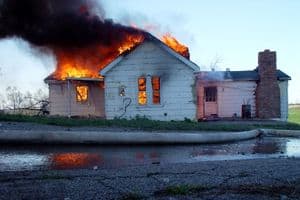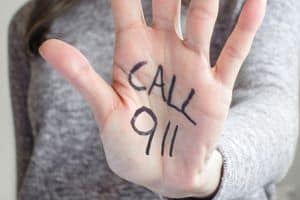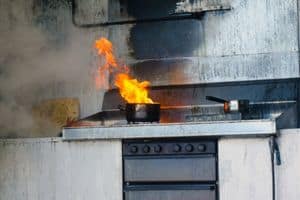When a fire breaks out in your home or office, all logic can very quickly go out the window, and rightfully so. However, you must be capable of keeping your wits about you as much as possible to avoid critical mistakes. What should you never do in a fire?

Here are 11 things to never do in a fire:
- Hide
- Delay calling emergency services
- Get in an elevator or lift
- Try to put out the fire yourself
- Go back into a fire once you escape
- Waste time trying to decide what you’ll grab
- Jump
- Open a Hot Door
- Break Windows
- Run and Flail If Your Clothes Catch Fire
- Throw Water On A Grease Fire
The above points are just the tip of the iceberg, as we’ve compiled a large list of things you should never do in a fire. Make sure you keep reading for the full list, as it’s for your safety and that of your loved ones!
Never Do This in a Fire
Hide
If an intruder broke into your home, hiding would be a good idea. Hiding is also useful if you’re being pursued or are waiting out a storm under cover.
However, there’s no use hiding from a fire.
Fires behave erratically. Since you can never predict where they’ll go, there’s no way to choose a suitable hiding spot.
Even if there was, what exactly would you be waiting for when hiding? A fire is going to keep burning unless it’s starved of oxygen.
In the case of a house fire or a building fire, if conditions are already severe enough, then it’s going to take the efforts of the fire department to extinguish the fire.
It may burn out on its own, but the amount of destruction the fire would leave in its wake means that’s not a possibility.
Thus, hiding does you no good. All you’re doing by hiding is trapping yourself somewhere and preventing the possibility of escape.
The escape route you could have used can be blocked off by fire or falling debris. The smoke in the room can get so thick and cloying that you can’t breathe and fall unconscious.
At that point, you’ll have to hope the firefighters who respond to the call find you in time.
What should you do when a fire starts? That’s simple: get out! Don’t hide.
Delay Calling Emergency Services
If you’re in the midst of a small kitchen fire, it’s easy enough to dismiss its severity and put off contacting emergency services like your local fire department.
As we made clear in the paragraphs above, a fire can grow very quickly and unpredictably. What begins as a small kitchen fire is engulfing your entire kitchen in a matter of seconds.
By that point, you’ll have really regretted not having called the fire department.
When a building is on fire, every second counts. Even if a fire is in its starting stages, trust that it will grow bigger and call the fire department the second you see the flames.
You’re also making the firefighter’s job easier by calling for help early into the life of fire. The smaller the fire is, the simpler it is to contain.

More of your home might be savable since the fire hasn’t spread throughout the entire building yet. Some of your possessions might even escape relatively unscathed!
It’s in your best interest to call for help immediately.
Also, I wrote an entire article on exactly what to say when you call 911. Click the link to check it out.
Get in an Elevator or Lift
Let’s imagine for a moment that the fire isn’t occurring in your home (thank goodness) but in your workplace or another commercial building instead.
This is a large, multistory building that has functional elevators.
You figure that you could run down several staircases all the way to the bottom, but that’s going to be extremely time-consuming. You could get winded before you reach the bottom, which would delay your escape.
You also worry that the stairs could be too congested with people, which would make for quite the claustrophobic situation.
Taking an elevator or lift is the much better alternative in your eyes. You can get down to the ground floor quickly, conserve your energy, and avoid a crush of people in a congested place.
While taking a lift does sound ideal, we would never recommend it during a fire.
Why not?
A fire is not occurring in a vacuum and can thus affect the elevator as well.
At any moment, the elevator can short-circuit due to fire damage or power can be cut to the entire building.
You would be stuck in the elevator in a burning building and possibly be unreachable to rescuers.
Should the elevator doors open on their own, which can happen after a short circuit, you could be exposed to significant amounts of smoke.
You see, smoke will naturally move toward the elevator shaft, and upon opening the doors, you’re breathing that all in.
You can’t close the doors manually in most cases, so you could choke and even die from smoke inhalation.
Although you might be stuck in a bit of a claustrophobic situation for a few minutes, the best option is to take the stairs to the bottom floor.
Try to Put the Fire Out Yourself
You own a fire extinguisher, so when a fire breaks starts your home, you figure that you can take care of it yourself.
After all, that’s what a fire extinguisher is there for, isn’t it?
Well yes, but it’s not as simple as that.
Not all fire extinguishers work for every kind of fire. If you’ve read our blog, then you’ll recall how different extinguishers can put out Class A, Class B, Class C, Class D, or Class K fires.
Each class of fire is different. For example, a Class A fire is caused by flammable materials such as plastic, rubber, paper, cloth, or wood.
A Class K fire is caused by cooking materials such as animal fats or oils as well as vegetable oils.
You’d not only have to know the type of fire you’re looking at to successfully put it out yourself, but then you’d have to have the right type of extinguisher for the job as well.
The extinguishing agents in a Class A fire extinguisher are only designed to put out fires from cloth or paper just as a Class K fire extinguisher is only intended to put out fires from fats.
If you use a Class A fire extinguisher on a Class K fire or vice-versa, it won’t do much of anything.
What’s worse is that in the meantime, you’ve wasted precious time that you didn’t really have trying to put the fire out.
If you have a small kitchen fire and the right type of fire extinguisher (which you should ideally ascertain long before a fire ever starts), then you can put it out yourself, but only after evacuating everyone else in the house.
That said, if you don’t feel comfortable using the extinguisher, that’s fine! Get out and contact emergency services.
It’s a fire department’s job to put out a fire no matter how small.
Go Back into a Fire Once You Escape
Did you safely evacuate from a fire yourself or did a firefighter rescue you?
You’re so glad to be out, as it was so scary in there, but then you remember something. You left your laptop or a family heirloom or your dog or even another family member in there.
No matter what’s still left behind, you should never venture back into the building yourself.
If there is another person in the building that the fire department has yet to accommodate for, you should certainly tell the firefighters so they can try to rescue that person.
You can even tell them if a pet is in the house. However, keep in mind that to a firefighter, the order of importance is always people first, pets second.
Whether you agree with that or not, that’s a firefighter’s attitude and how they will handle the order of operations when rescuing victims.
If they can go back in safely and look for a precious pet, then they will. If they can’t, then so be it.
A firefighter likely will not try to go back in for a household item, and they will certainly prohibit you from doing it.
No matter what the item is and how valuable, it’s not more valuable than a human life. You cannot put a price tag on that.
Waste Time Trying to Decide What You’ll Grab
If you notice a fire early enough, then you might have a few seconds to grab a personal item or two and then make your way out of the burning house.
Some people take this logic and run way too far with it, assuming that they can grab half the house before they can go.
Well, let us tell you that you cannot do that.
In some cases, you might not have time to grab anything, and you’re going to be have to be okay with that. As we said before, a human life is irreplaceable, but stuff can always be replaced.
If you can grab something, then choose one or two items, tops. Be smart in what you bring as well.
For example, you cannot lug a TV out of a burning building or a family safe. It’s just not feasible. Grab light items that you can easily take with you.
If it’s going to take you more than a minute to find the item, then you have to let it go. That’s also true if the fire has blocked off access to what you wanted.
Personally, we would recommend focusing the most on making sure that your loved ones evacuate. If you have a few seconds before you have to be out of the house yourself, it’s better to collect pets than it is stuff.
Jump
If a fire begins tearing through your home or office and you’re several floors up, then you might not be sure if you can get to the ground floor.
There’s a window in the vicinity, so you figure you’ll open the window and jump.
You’re not going to fling yourself out with reckless abandon, of course, but you’ll jump and look for a soft place to land.
Please, unless it truly is your only option, do not jump.
No matter how small the distance looks to you from your vantage point, we promise you it’s further than it appears.
At the very least, your hard landing might knock you unconscious and/or cause you to break several bones.
If you’re still close to the fire–which is likely–then you’re not in the clear. The worst part is that you’re not capable of getting up of your own volition and getting to safety. You’re still in danger and you will need rescuing.
That’s the best-case scenario, by the way.
The worst-case scenario is that the fall can kill you.
That would certainly be the case when jumping from several stories in a commercial building, and it can happen if you jump from the second or third story of your home as well.
If you must escape through the window, then use a rope. You can create your own makeshift rope by tying some bed sheets together.
Open a Hot Door
If you wake up to the smell of thick, choking smoke, then the fire in your home could already be well in progress.
This limits your escape options, forcing you to choose your way out carefully.
When you see a door, your natural inclination is to push or pull it open so you can continue progressing through the house and get out.

However, a closed door could open up to an even more horrific sight than the one in front of you.
If the door is giving off noticeable heat, which you’ll be able to feel if you’re standing close enough to it, back away and find another route. You should certainly never open the door if the knob feels hot to the touch.
Another sign that this door is a no-go is if you see smoke billowing up from the gap underneath. A fire perhaps more severe than the one is all that will await you if the open the door.
Should you find a door that isn’t throwing heat and doesn’t have billowing smoke, then it’s likely safe to open that door and proceed through.
That said, you should still open the door slowly and enter even slower.
Break Windows
If the smoke in the room you’re stuck in is getting so thick that you feel like it’s choking you, then you’re going to want to open the window in the room you’re in – and you should. As a general rule, you should always do whatever you need to do in order to escape a burning building.
The only issue is the window could have melted shut, so you’ll just have to smash it. This will vent the smoke out and possibly give you an escape route as well.
However, what happens is even worse. You’re introducing fresh oxygen to the fire.
A fire, according to the fire triangle, needs three things to burn: oxygen, heat, and fuel.
Now that the fire has more oxygen, it can burn more readily.
The flames in the room will suddenly grow in heat and intensity, thus bringing with them worsening conditions.
As tempting as it may be, you should never break any windows in the home when dealing with a fire, unless it’s your only chance at escape.
Now, if you’re a bystander outside of the home on fire, unless you know it is someone’s only way out, DO NOT BREAK ALL THE WINDOWS TO THE HOUSE.
This is not helpful to the fire department and may make conditions worse and more dangerous for firefighters.
Run and Flail If Your Clothes Catch Fire
At some point, your clothing might become alight if you get too close to an ongoing fire.
This is a very scary scenario, as if your clothes are burning, then it’s only a brief matter of time before your skin can begin burning as well.
The right thing to do in this scenario is the classic stop, drop, and roll, and be sure to cover your face when you do!
We’re sure it’s been a long time since you’ve learned the whole stop, drop, and roll routine in school, but it wasn’t just a catchy slogan. It can save lives!
Also, whatever you do, if your clothes catch fire DO NOT RUN. Your best move will be to stop, drop, and roll.
Throw Water On A Grease Fire
Here’s the last thing you should never do in a fire (especially a grease fire): throw water on it.
You might see firefighters extinguish a fire with water, but theirs is highly pressurized. It’s not always water that comes out of fire hoses either, but sometimes it’s a foam fire retardant.

Filling a glass of water from the tap and dousing the fire with it is dangerous.
If it’s a grease fire, the fire can only grow. If it’s an electrical fire, then you could get electrocuted since water is a conductor of electricity.
Using a fire extinguisher is a good means of putting out a fire, as is throwing a fire blanket on the flames, as that chokes them of oxygen. However, this only works for small fires.
As we said earlier, the best course of action is not to put out a fire yourself but rather to call the fire department immediately.
Conclusion
Fire safety starts with you. Although it’s easy to panic during a fire and forget everything you know, it’s paramount that you always keep these points in mind. They’ll ensure you can safely escape a fire!